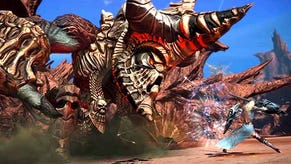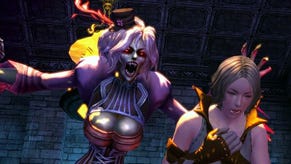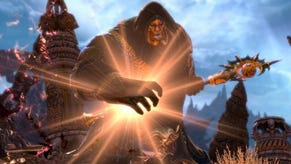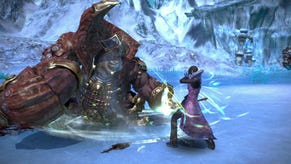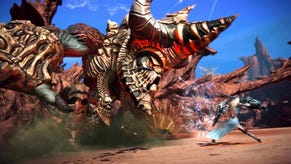Tera's Political System: A Tale Of Ad Space And Exploits
Vanarchy Reigns
Once upon a time, streamlined WoW-style questing, raiding, and PVP felt fresh and daring. However, like most things that begin with the phrase "once upon a time," the very notion seems almost unbelievable in this day and age - more akin to a swords 'n' sorcery fairytale than actual historical fact. And so, many MMOs that were once treading water have recently realized that they were in quicksand all along. In many ways, Tera's easily as guilty as anyone else with its utterly tedious questing and tired world design, but the action-heavy MMO's hardly resting on its laurels. Its province-running political system is an attempt to add a dash of EVE-style intrigue to the tried-and-true MMO formula, and the results thus far have ranged from brilliantly outside-the-box to well inside the range of the banhammer.
For the uninitiated, Tera now hosts monthly player-driven elections that allow players to become "Vanarchs" of certain regions. This allows them to do leaderly things like levy taxes, manage stores (OH GOD SOCIALISM), enable and disable certain trainers, and even shut down open-world PVP. Also, they get a neat horse. The end result? A race to the top with all sorts of wild political maneuvering - at least, initially.
"An MMO is about choices within a world," senior producer Brian Knox explained to RPS. "We have a story we want to tell, and that is told through our progressive content from levels 1 to 60. Once you hit 60, though, we want the stories to be yours. Whether politics, big-ass monsters, PvP, or role-playing is your thing, we want to help facilitate that."
"By far the most interesting campaign came from Oloh, who actually bought ad space on one of the Tera database sites to promote his run for election. It was awesome to see players think outside the game world about how they can affect their political struggle in the game. Beyond that, the amount of collusion - either paying or trading for votes - has been surprising. Sometimes it’s hard enough to get parties to work together, much less entire guilds."
In theory, then, the political system opens up an entirely new sort of endgame. Sure, instances and PVP are still there for those who feel so inclined, but to many, they're old hat. Knox and co know this, so Tera - initially maligned for its same-y structure - is about to pack its bags (which shouldn't be terribly difficult for its rather distressingly "clothed" female characters) and set off in a new direction.
"By setting up players as part of the same union, the Valkyon Federation, we are able to tell the grand story of the world while at the same time allowing players to create their own story within the federation," he explained. "We bring the Argon War story to a climax in our next big update at the end of August, and as that concludes, we start shifting the focus to the players’ stories - which means expanding and improving the political system."
Here's the problem, though: En Masse and Bluehole recently introduced the ability to gain office by winning massive Guild vs Guild battles, and players - opportunity-whiffing noses gently brushing up against their evil mustaches - took full advantage. Some guilds decided to practice Vanarchism anarchism by splitting in two and farming each other for kills. (If only politics were so simple in real life.) En Masse and Bluehole, however, weren't entirely caught off-guard.
"We are always expecting players to try to find ways around a system, but I was surprised at the lengths they went to take advantage of the system," Knox admitted. "We broke the golden rule and underestimated the community’s ability to do whatever it takes."
And while En Masse and Bluehole are taking measures to ensure this sort of thing doesn't ruin the experience for everyone else, they're not cracking down as hard as they could. It is, admittedly, not quite a replication of EVE's (almost) anything-goes mentality, but Knox and co follow a similar philosophy: put up too much red tape and you'll strangle player creativity.
"Right now we are monitoring the competition and have issued a warning that killing alternate characters of your guild will not be tolerated," said Knox. "We have a few more system rules we could implement, but with each new rule or boundary, the sandbox feeling slips away, and eventually we’re back into [traditional MMO] theme park territory. It’s a powerful feeling to know that you can do something, but that getting caught will have consequences."
At the end of the day, then, it's all about striking a balance. Tera will probably never replicate the politically-charged insanity of EVE Online, but it's doing its best to find a middle ground between easy accessibility and player-driven unpredictability. It is, in that sense, quite an exciting prospect. On one hand, Knox fully acknowledges that "MMORPGs take a lot of heat for, well, being MMOs; there are certain expectations for the genre, yet when you hit these expectations you can get drilled for it." But, at the same time, advances like Tera's show that - at the very least - change is occurring, even within the most traditional of wrappers.
At this point, it's anyone's guess as to where the genre will actually end up, but for Knox, that's not a bad thing at all.
"This is what really defines MMORPGs: the unknown results of adding a new system or tool to a world with thousands of players. It is so hard to predict how the community will take and use what you have created. It is by far one of the most rewarding parts of my job and why I love the MMORPG business so much."



